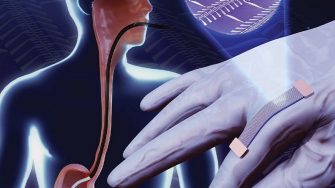
Our researchers use mechanical and materials Engineering expertise to develop soft wearable sensors to monitor a range of biological signals related to individual health conditions. We collaborate closely with industry, healthcare professions, hospitals, and not-for-profit funding agencies. Our projects have been supported through Australian Research Council (ARC) programs including Research Hub, Future Fellow, and Discovery Projects.
Wearable biophysical sensors
Our research is focused on advancing the field of personalized health monitoring through the design and development of cutting-edge soft wearable biophysical sensors. In contrast to conventional sensing platforms based on rigid semiconductors, our approach integrates wearable sensors from flexible and stretchable materials. This strategy not only addresses the rigidity issues associated with traditional platforms but also allows our sensors to seamlessly conform to the unique contours of human body. This adaptability will enhance comfort and facilitate continuous monitoring over extended periods. Through a combination of microstructure design and materials innovation, we have achieved high levels of sensitivity in our sensors, which enables the accurate detection of subtle changes in pressure, strain, shear, and temperature—crucial parameters linked to various physiological activities, providing a comprehensive and dynamic understanding of an individual's health status. In our commitment to ensuring the practical utility of our biophysical sensors, we are actively engaging in collaborative efforts with healthcare professionals. Through rigorous clinical validation and testing, we are verifying the accuracy and reliability of our sensors, which is critical for securing regulatory approval and firmly establishing our biophysical sensors as indispensable components within the healthcare landscape.
Stretchable conductors
Stretchable conductors are the key element to connect all electrical functional components including data acquisition/transmission units, power supply, and sensor. Our research aims to advance a new technology for effectively toughening most common conductive thin films including metals and conductive polymers with significantly improved mechanical robustness for next-generation stretchable electronics. By tackling the bottleneck issue of low stretchability and ductility of existing conductive thin film materials, our research will significantly expand the design space of flexible and stretchable electronic devices to beyond wavy curves constructed from low-ductility conductive materials. Furthermore, the new stretchable conductors will facilitate low-cost manufacturing of micro- and nano-metre sized devices using conventional processes such as sputtering, ink-jet printing, and evaporation, which enables integration microelectronics with miniaturized dimensions.
Energy harvesting and storage
Wearable electronics traditionally rely on power sources such as batteries. However, these battery-powered devices often face challenges such as bulkiness, limited lifespan, and potential safety risks associated with batteries. Our research is focused on exploring sustainable and efficient energy alternatives to power wearable electronic systems. We've successfully developed triboelectric nanogenerators and piezoelectric nanogenerators with significant energy outputs to power piezoresistive sensors. Additionally, our work includes the creation of self-powered vibration sensors featuring high sensitivity, enabling precise monitoring of vibration events triggered by human speech, machine rotation, and impacts. In collaboration with industry partners, we are also actively engaged in the development of energy harvesters tailored for powering implantable medical devices.


